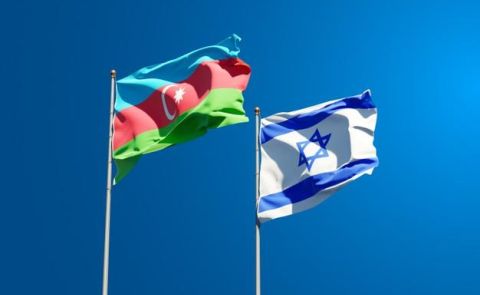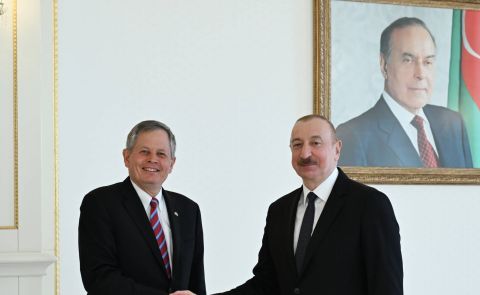
South Caucasus countries in the US State Department Human Rights Report 2019

On 11 March, the US State Department issued their country reports on human rights, outlining the major trends and challenges in every country in regard to human rights. Individual reports have been published on all three South Caucasus countries of Armenia, Azerbaijan and Georgia.
Armenia
The executive summary read that significant human rights issues in the country included: torture; arbitrary detention, although with fewer reports; harsh and life-threatening prison conditions; arbitrary interference with privacy; significant problems with the independence of the judiciary; crimes involving violence or threats of violence targeting lesbian, gay, bisexual, transgender, or intersex (LGBTI) persons; and use of forced or compulsory child labor.
The government took steps to investigate and punish alleged abuses by former and current government officials and law enforcement authorities. For example, throughout the year, an investigation continued into the culpability of former high-ranking government officials surrounding events that led to the deaths of eight civilians and two police officers during post election protests in 2008.
There was at least one report that the government or its agents committed an arbitrary or unlawful killing. There were also reports that members of the security forces continued to torture or otherwise abuse individuals in their custody.
Although the law provides for an independent judiciary, the judiciary did not generally exhibit independence and impartiality. After the 2018 political transition, popular distrust in the impartiality of judges remained strong, and NGOs highlighted that the justice sector retained many officials who served the previous authorities. Corruption of judges remained a concern. During the year NGOs stressed that many judges had acquired significant amounts of property and assets that were disproportionate to their salaries and noted that the absence of vetting of judges based on objective criteria–particularly of those in the Supreme Judicial Council and Constitutional Court–undermined the integrity of the judiciary.
Since the 2018 political transition, the media environment has been freer, as some outlets began to step away from the earlier practice of self-censorship; however, there were reports that some outlets avoided criticizing the authorities so as not to appear “counter revolutionary.” In its final report on the December 2018 elections, the OSCE Office of Democratic Institutions and Human Rights (ODIHR) Election Observation Mission stated that while most interlocutors noted improvements in media freedom and an increase in plurality of opinions since April 2018, some also noted that the postrevolutionary public discourse was not conducive to criticism of the government, in particular, the then acting prime minister. Many traditional and online media continued to lack objective reporting.
Freedom of assembly improved after the political changes of spring 2018, resulting in more assemblies held during the year. The report also noted that police methods had become more restrained. The most significant problems observed related to rally participants’ and organizers’ use of hate speech aimed at a person’s gender identity, sexual orientation, or religious views.
In regard to the internally displaced persons, according to the Internal Displacement Monitoring Center, approximately 8,400 internally displaced persons (IDPs) of the estimated 65,000 households evacuated in 1988-1994 were still living in displacement. Some of the country’s IDPs and former refugees lacked adequate housing and had limited economic opportunities. The government did not have IDP-specific programs and policies aimed at promoting the safe, voluntary, dignified return, resettlement, or local integration of IDPs.
In regard to corruption, the report stated that the country has a legacy of systemic corruption in many areas, including construction, mining, public administration, the parliament, the judiciary, procurement practices, and provision of grants by the state. There were allegations of embezzlement of state funds, involvement of government officials in questionable business activities, and tax and customs privileges for government-linked companies. In 2018 the government made combating corruption one of its top priorities and continued to take measures to eliminate it during the year. Although top officials announced the “eradication of corruption” in the country, local observers noted that anti-corruption measures needed further institutionalization. Criminal corruption cases were uncovered in the tax and customs services, the ministries of education and health care, and the judiciary.
Domestic and international human rights groups generally operated without government restrictions, investigating and publishing their findings on human rights cases. Civil society organizations considered the government change a window of opportunity for closer collaboration. Government officials were often cooperative and responsive to their views.
Azerbaijan
The report highlighted significant human rights issues, such as unlawful or arbitrary killing; torture; arbitrary detention; harsh and sometimes life-threatening prison conditions; political prisoners; arbitrary interference with privacy; pervasive problems with the independence of the judiciary; heavy restrictions on free expression, the press, and the internet, including violence against journalists, the criminalization of libel, harassment and incarceration of journalists on questionable charges, and blocking of websites; substantial interference with the rights of peaceful assembly and freedom of association; restrictions on freedom of movement; refoulement of refugees to a country where they would face a threat to their life or freedom; severe restrictions on political participation; systemic government corruption; police detention and torture of lesbian, gay, bisexual, transgender, and intersex individuals; and the worst forms of child labor, which the government made minimal efforts to eliminate. The Azerbaijani government did not prosecute or punish most officials who committed human rights abuses; impunity remained a problem.
There were several reports that the government or its agents committed arbitrary or unlawful killings. Most mistreatment took place while detainees were in police custody, where authorities reportedly used abusive methods to coerce confessions.
The law provides that persons detained, arrested, or accused of a crime be accorded due process, including being advised immediately of their rights and the reason for their arrest. In all cases deemed to be politically motivated, due process was not respected, and accused individuals were convicted under a variety of spurious criminal charges.
Although the constitution provides for an independent judiciary, judges did not function independently of the executive branch. The judiciary remained largely corrupt and inefficient. Credible reports indicated that judges and prosecutors took instruction from the presidential administration and the Ministry of Justice, particularly in politically sensitive cases. There were also credible allegations that judges routinely accepted bribes. On April 3, the Azerbaijani President Ilham Aliyev signed a decree on limited reforms in the justice sector which did not take ist full effect in the moment of the writing of the report.
Following the March 16 release of 52 persons widely considered to be political prisoners, nongovernmental estimates of political prisoners and detainees at year’s end ranged from 112 to 135. They included journalists and bloggers, political and social activists, religious activists, individuals arrested in connection with the Ganja case, and the relative of a journalist/activist in exile.
While the law provides for freedom of expression, including for the press, and specifically prohibits press censorship, the government habitually violated these rights. The government limited freedom of expression and media independence. Journalists faced intimidation and at times were beaten and imprisoned. During the year authorities continued to pressure media, journalists in the country and in exile, and their relatives.
Throughout the year government-owned and pro government outlets continued to dominate broadcast and print media. A limited number of independent online media outlets expressed a wide variety of views on government policies, but authorities pressured them in various ways for doing so. The 2019 International Research & Exchanges Board (IREX) Media Sustainability Index stated that “access to independent news sources in Azerbaijan gets more limited from year to year” and that “there is no independent print media in the country.” The government severely restricted freedom of peaceful assembly. Authorities at times responded to peaceful protests and assemblies by using force and detaining protesters.
The government reported 651,458 registered internally displaced persons (IDPs). The vast majority fled their homes between 1988 and 1994 as a result of the Nagorno-Karabakh conflict. IDPs had access to education and health care, but their unemployment rate was higher than the national average. Some international observers stated the government did not adequately promote the integration of IDPs into society.
Although the constitution provides citizens the ability to choose their government through free and fair elections held by secret ballot and based on universal and equal suffrage, the government continued to restrict this ability by interfering in the electoral process. While the law provides for an independent legislative branch, the National Assembly exercised little initiative independent of the executive branch.
While the government made some progress in combating low-level corruption in the provision of government services, there were continued reports of corruption by government officials.
Georgia
The summary on Georgia read that significant human rights issues included: unlawful or arbitrary deprivation of life by Russian and de facto authorities in the Russian-occupied Georgian regions of Abkhazia and South Ossetia, including unlawful or arbitrary killing in Abkhazia; arbitrary detentions by the government and Russian and de facto authorities; significant problems with the independence of the judiciary and investigations and prosecutions widely considered to be politically motivated; unlawful interference with privacy; inappropriate police force against journalists; substantial interference with the right of peaceful assembly, including inappropriate police force against protesters; and crimes involving violence or threats targeting lesbian, gay, bisexual, transgender, and intersex (LGBTI) persons.
It further emphasized that the government took steps to investigate some allegations of human rights abuses, but shortcomings remained, including a lack of accountability for the inappropriate police force used against journalists and protesters during June 20-21 demonstrations and the 2017 abduction and rendition from Georgia of Azerbaijani journalist and activist Afgan Mukhtarli.
There were no reports that the government or its agents committed arbitrary or unlawful killings, but there was one report that an illegal detention led to an unlawful killing. Torture and other forms of cruel, inhuman, or degrading treatment remained “one of the most important challenges faced by the country.”
Local NGOs considered the detention of some individuals in connection with the June 20-21 protests to be politically motivated. In a joint September 9 statement, 16 local NGOs expressed alarm concerning what they termed an “increased number of politically motivated criminal investigations and prosecutions.” They cited examples such as the criminal case against the two founders of TBC Bank, the criminal case against the former director of the television station Rustavi 2, the criminal case against the father of the owner of TV Pirveli, and some cases of incarceration of those who in June protested Russia’s occupation, including opposition party leader Irakli Okruashvili
The PDO, the Coalition for an Independent and Transparent Judiciary, and the international community continued to raise concerns regarding a lack of judicial independence. During the year they highlighted problems, including the influence of a group of judges primarily consisting of High Council of Justice members and court chairs that allegedly stifled critical opinions within the judiciary and obstructed proposals to strengthen judicial independence. Other problems they highlighted included the impact of the High Council’s powers on the independence of individual judges, manipulation of the case distribution system, a lack of transparency in the High Council’s activities, and shortcomings in the High Council’s appointments of judges and court chairpersons.
During the year journalists, NGOs, and the international community raised serious concerns regarding the environment for media pluralism. The PDO noted in its 2019 report covering 2018 that a healthy media environment and proper statistics on offenses committed against journalists remained an issue. Independent media were very active and expressed a wide variety of views. NGOs continued to criticize the close relationship between the heads of the Georgian Public Broadcaster (GPB) and Georgian National Communications Commission (GNCC) and the ruling party, and GPB’s editorial bias in favor of the ruling party. The OSCE/ODIHR election observation mission reported that during the second round of the 2018 presidential election campaign, the national public broadcaster manifested “a clear bias against the opposition candidate” and did not provide for “editorial independence, fairness and impartiality of programs.” According to the mission, the GNCC did not always conduct oversight transparently and impartially.
The PDO and NGOs reported that police sometimes restricted, or ineffectively managed, freedom of assembly.
According to the government, as of October there were approximately 280,000 IDPs from the 1992-93 and 2008 conflicts. The Office of the UN High Commissioner for Refugees (UNHCR) estimated 235,176 persons were IDPs, with the remaining 50,000 in “IDP-like” situations in need of protection and humanitarian assistance. The government provided monthly allowances to persons recognized as IDPs, promoted their socioeconomic integration, and sought to create conditions for their return in safety and dignity.
In regard to corruption, while the government implemented the law effectively against low-level corruption, NGOs cited weak checks and balances and a lack of independence of law enforcement agencies as among the factors contributing to allegations of high-level corruption. NGOs assessed there were no effective mechanisms for preventing corruption in state-owned enterprises and independent regulatory bodies. While noting that petty bribery was extremely rare, Transparency International continued to describe corruption as a “serious problem” in the country. The Anticorruption Coordination Council included government officials, legal professionals, business representatives, civil society, and international organizations.
Much attention was also paid on the situation of the separatist regions of Abkhazia and Tskhinvali. The de facto authorities in the Russian-occupied regions remained outside central government control and were supported by Russian forces. While there was little official information on the human rights and humanitarian situation in Tskhinvali due to limited access, allegations of abuse persisted. The de facto authorities in the Russian-occupied regions restricted the rights, especially of ethnic Georgians, to vote or otherwise participate in the political process, own property, register businesses, and travel. The also did not allow most international organizations regular access to Tskhinvali to provide humanitarian assistance. Russian “borderization” of the administrative boundary lines (ABLs) increased, separating residents from their communities and livelihoods.
See Also

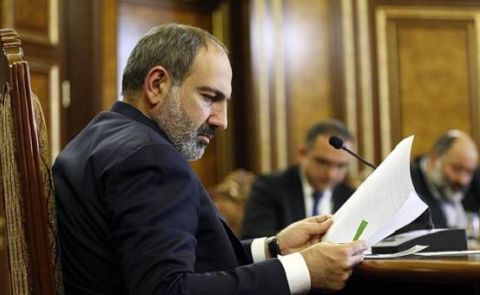
Pashinyan Commemorates First Republic Day, Highlights Progress in Sovereignty and Peace Efforts
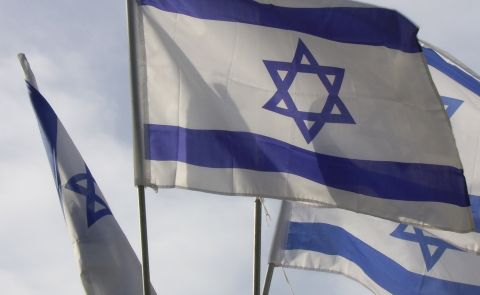
Israeli Ambassador to Armenia Acknowledges Challenges but Optimistic About Future Armenian-Israeli Cooperation

EU Plans Closer Cooperation with Azerbaijan, Georgia, Türkiye, and Other Black Sea States
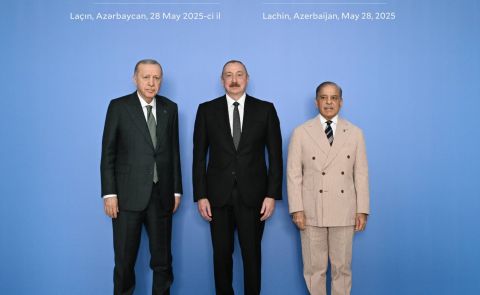
Azerbaijan, Türkiye, and Pakistan Highlight Growing Strategic Cooperation at Lachin Summit
